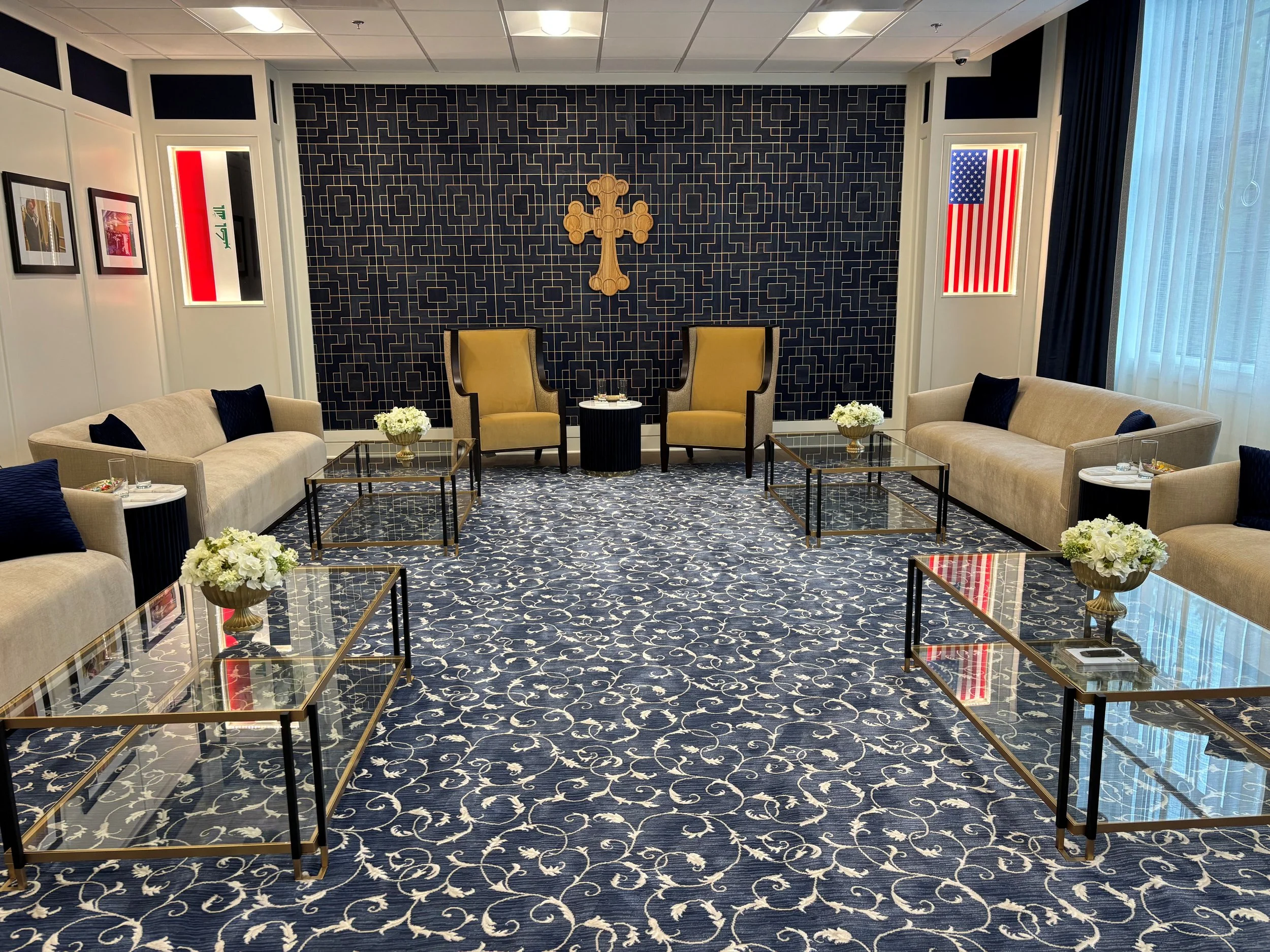The Salim Y. Sarafa Protocol Room
A Legacy of Diplomacy
By Michael Sarafa
Protocol.
That became our catchphrase during our trip to Iraq in the fall of 2023—sometimes used in jest, sometimes in earnest.
In Iraq, “protocol” carries far more weight than the relatively informal customs of the more egalitarian West. There, it’s a profession. Every ministry, embassy, and consulate general office has a full department of protocol staff. In Kurdistan, some government vehicles even have license plates that read “Protocol.”
These teams handle everything from seating arrangements and greeting order to the shape of tables and the number of flags on display. During the Iraqi prime minister’s visit to Shenandoah, for example, because no American head of state was present, there was no American flag. That decision drew some criticism.
On our initial delegation in 2023—and again during our visit to Baghdad earlier this year—one thing became quickly apparent: all the rooms were set up the same. With the exception of one meeting (of more than 30), there were no conference tables.
Instead, formal “meeting rooms” resembled traditional living rooms, with one or two chairs at the head of a rectangular room and short couches or individual chairs lining the sides. Water, tea, and Arabic coffee were served automatically, almost always by men from the Protocol Department.
LISTEN TO THIS STORY!
CN Audio Stories are made possible with generous support from the Chaldean American Chamber of Commerce
In Iraq, where you sit signals your rank. For meetings with top officials like the president or prime minister, there was typically only one chair placed in front. When there were two, the second was usually reserved for Martin Manna, who led our delegation. From there, we fanned out along the sides—often joking that “protocol” dictated our every move.
“Sit in the first chair next to me,” Martin once told me.
“Why?” I asked.
“Because I don’t have much to say for this meeting. When I run out of things to talk about, you talk,” he said.
The concept of a “protocol room”—while rarely referred to by that name in the West—has long been an integral feature of political and diplomatic architecture in the Middle East. In Iraq, especially during the monarchy and continuing through successive republics, these spaces were purposefully designed to reflect order, respect, and hierarchy. They were less about negotiation and more about signaling alliances, building trust, and observing the formalities that define relationships between dignitaries and state actors.
From the royal courts of the Hashemite Kingdom to the revolutionary regimes that followed, such rooms conveyed the tone of governance. With their symmetrical arrangements and deliberate seating charts, they embodied the idea that diplomacy starts with presentation. Every cushion, every cup of tea, every seat had meaning.
At the time of that first trip—over Thanksgiving in 2023—the Chaldean Community Foundation West building was still in the planning stages. That visit inspired a key feature of the new campus: the “Protocol Room.” When naming rights became available, my siblings and I chose to sponsor the room in honor of our late father, Salim Y. Sarafa. Today, the beautifully designed and furnished space is officially the Salim Y. Sarafa Protocol Room.
Our father would have felt right at home in such a room. A passionate advocate for strong ties between the Old Country and the New, he valued communication and cooperation—regardless of regime or ideology. The room’s walls now feature photos of him with King Faisal II and Michigan Gov. Soapy Williams, as well as Abdel Karim Qasim and other notable figures. He believed, even amid changing leadership in Iraq, that engagement was essential for the well-being of Chaldeans on both sides of the ocean.
That tradition continues today under Martin Manna and the Chaldean Community Foundation, which remains committed to open dialogue with the Iraqi government. The hope is that discussions held in this room will help improve conditions for Iraqi Christians and the global Chaldean diaspora. While the community in Iraq has dwindled due to decades of war and the devastation of ISIS, the mission endures.
In the years ahead, the Salim Y. Sarafa Protocol Room will host dignitaries and meetings with leaders from the United States, Iraq, and around the world.
Protocol, after all, demands it.


